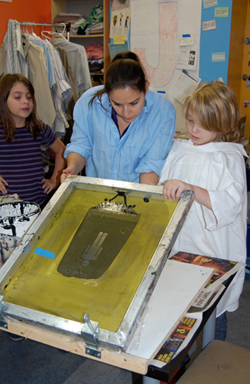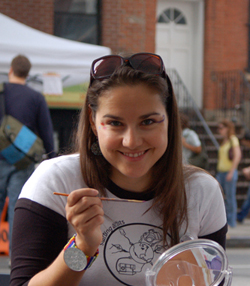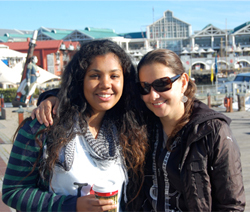Entrepreneurial Spotlight: Marisa Catalina Casey
Casey founded Starting Artists in 2006 while working 40 hours a week as an administrative coordinator.
By Elizabeth Dwoskin
In the first session of summer programming offered by her non-profit organization, Starting Artists, Marisa Catalina Casey asked a group of middle and high school students to define the term “entrepreneur.”
Many didn’t know what the term meant—but Casey wasn’t discouraged. She saw the the students’ response as both a challenge and a piece of useful information that would help her to better understand her target audience.
“We assumed they would know and they didn’t, so it showed us that there was a lot of work to be done,” she said. “That was terrific.”
Casey founded Starting Artists in 2006 while working 40 hours a week as an administrative coordinator. She was also enrolled as a full-time student in TC’s Arts Administration Program. “I want to do things now,” she says. “I don’t want to wait.”
Casey came to the Arts Administration Program knowing she wanted to create an arts program that would teach students critical business skills to market and make money from their work.
At the start of her second year in the program, she began recruiting fellow students to become future board members for Starting Artists. The students designed curricula for the new venture and drew up a charter.
In the second semester, while many of her colleagues were searching for jobs, Casey was busy creating hers. She held fundraisers and scouted location sites. She volunteered twice a week teaching after school at the Urban Assembly of Music and Art, a high school in downtown Brooklyn, which didn’t have a yearbook or even a school newspaper. She taught the students budgeting and marketing, and for a final project, helped them create an arts magazine. She also recruited students from a Columbia Business School class to conduct “market research” on the interests of the young people she planned to serve.
By Summer 2008, with only a few thousand dollars in seed funding, Casey’s program was up and running in its own space, in Brooklyn’s Boerum Hill section. She began with 25 students, ages 13 to 19, and held all-day programming in four two-week sessions.
“Entrepreneurship builds confidence, encourages innovation and allows youth a safe space to test out ideas, fail and try again,” says Casey. “All of that is inherent in the artistic process, so, in my mind, pairing the arts and entrepreneurship is a natural thing.”
Casey’s students studied photography, graphic design, film, animation, print-making and other topics activities found in more traditional arts programs. But they also took entrepreneurship courses that included grant-writing instructions, entering contests and designing business plans based on their work. They went on field trips to PBS and other local arts and media organizations. Casey made sure that the program was fun, rotating food for lunch from local restaurants. “We didn’t want it to feel like school,” she says.
The biggest success came when the students produced a public service video that aired in Times Square this past fall. The video won a contest organized by the organization Americans for the Arts. Called “Why Arts Matter,” the video features a fast-moving collage of words and images that Casey shot in New York City, all an attempt to answer the question of “Why art matters to me.”
Another group of students in the program founded the Creative Entrepreneurs Club, which provided pro bono photography, brochure design and other creative services to local non-profits through a competitive grant process. The students were paid stipends through a grant from Starbucks.
Casey benefited from early exposure to entrepreneurship in the non-profit sector. Her mother, Filis Casey, founded the Alliance for Children, the first international non-profit adoption services organization in Massachusetts. “She taught me to surround myself with great people,” says Casey, who was adopted from Colombia at the age of three. “And to never forget about those who may not be able to speak out for themselves.”
At 16, Casey did photography for a calendar to benefit international orphanages, which ended up being sold in Barnes and Noble. Later, as an undergraduate at Brown University, she founded a photography magazine while studying Latin American Studies. She learned grant-writing skills working at the Hearst Foundation before attending TC.
This past December, Casey shut down Starting Artists—“temporarily,” she emphasizes—in order to pursue the next dream: she and her husband have joined the Peace Corps and will begin their service in Latin America this summer. “If I could do it all over again, I would find a way of doing it using a social entrepreneurship model,” she says of Starting Artists Corps and will begin their term of service in Latin America this summer. “I can see Starting Artists working in a wide variety of communities where young people have untapped talent and the passion to express themselves and to give back.”
Published Monday, Mar. 28, 2011



